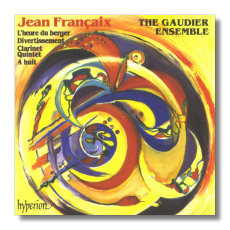
The Internet's Premier Classical Music Source
Related Links
- Françaix Reviews
- Latest Reviews
- More Reviews
-
By Composer
-
Collections
DVD & Blu-ray
Books
Concert Reviews
Articles/Interviews
Software
Audio
Search Amazon
Recommended Links
Site News
 CD Review
CD Review
Jean Françaix

Chamber Music
- À huit
- Divertissement
- Clarinet Quintet
- L'heure du berger
The Gaudier Ensemble
Hyperion CDA67036 62:35
Summary for the Busy Executive: Le française Françaix.
A prodigy, the composer Jean Françaix studied with Nadia Boulanger, the great musical pedagogue of the Twentieth Century. To some extent, he follows up on the early works of Les Six – the composer group consisting of Darius Milhaud, Francis Poulenc, Arthur Honegger, Georges Auric, Germaine Tailleferre, and Louis Durey, who in turn regarded Erik Satie as to some extent their musical father. The composers of the group quickly went their own individual ways. However, the group aesthetic, as articulated by Jean Cocteau, seemed to satisfy Françaix.
Françaix's music exhibits the qualities I think of as quintessentially French, with, above all, a sense of mesure – moderation, proportion. The music reveals itself in its limits, like a formal garden. It doesn't storm the heavens or strive to transcend the bonds of earth unlike, say, a Mahler symphony, its antipode. The scale remains human, rather than titanic. The composer took to heart Debussy's dictum that "music should seek, humbly, to please." Wit, tenderness, bright tunes, and surface beauty are Françaix's hallmarks.
Although he has written in large forms, I find Françaix's essence and his most affecting work in chamber music. All the items here show fastidious workmanship and, despite simple overall structures, great subtlety and elegance.
À huit ("for eight") uses the same instrumentation as the Schubert octet. The title – instead of the more usual "Octette" – may even be a pun: "Ah, oui!" It begins with a gorgeous idea – not really a melody, but more like a kid's chant, here slowed down and with the bassoon imitating the clarinet lead. It leads to a quick section with another idea of a similar type. Overall, it bustles like the soundtrack to a René Clair musical. The finale is a Parisian valse, with moments evoking hurdy-gurdy and music box. The other movements show the same tension between simple basic ideas and sophisticated, contrapuntal treatment.
The Divertissement for bassoon and string quintet, one of Françaix's most-played works, also exists in a version with string orchestra, a mini-concerto for the bassoon, which rarely gets the chance to star. The brief movements – mixing bounce with long, lyrical singing – fit the solo instrument like a Chanel suit. The amount of pathos Françaix can get in a movement under three minutes constantly surprises.
A late work (1977), the ambitious Clarinet Quintet inevitably brings up comparisons to Mozart's score. Although I haven't found any direct point of homage, Françaix probably had Mozart's piece somewhere in the back of his mind. The elegance of the writing and the equal distribution of interest among all the players recalls Mozart. The themes and the structure also are slightly more complex, although never obscure, again alternating tendresse and a boulevardier saunter. That Françaix can get so much variety out of these two basic idioms amazes me. Actually, should you ask, I prefer the Françaix to the Mozart, a fine piece, but one that doesn't hit me as deep, especially when I listen to the respective slow movements side by side. The Mozart allows the clarinet to spin out long lines, as does the Françaix, but in the latter the clarinet becomes a sage who knows what being human means. The rondo finale has a toy-march quality to it.
Françaix wrote L'heure du berger in 1947 as a kind of high-class Muzak for a noted French brasserie. It comes from a vogue for commissioning "high-class" music for various commercial enterprises like openings and fashion shows. Of course, the score was better than that, and this piece for wind quintet and piano has had a life that extended beyond its immediate circumstance. The work has three short movements: "Les vieux beaux" (roughly, Sugar Daddies), "Pin-up Girls," and "Les petites nerveux" (the little nervous ones). The score sparkle with a slight wit. The sugar daddies weave, slightly drunk, to their tables. The pin-up girls sit around languidly, soaking up male admiration and something like wolf whistles, as hearts beat faster. The finale shows perhaps the waiters scampering with trays (almost but not quite off-balance) to the customers.
The Gaudier Ensemble nails this music, and I don't think there's a Frenchman among them. They get the wit, the fun, and the layers beneath in well thought-out readings that nevertheless sound effortless. Beautifully recorded, besides.
Copyright © 2013, Steve Schwartz





















